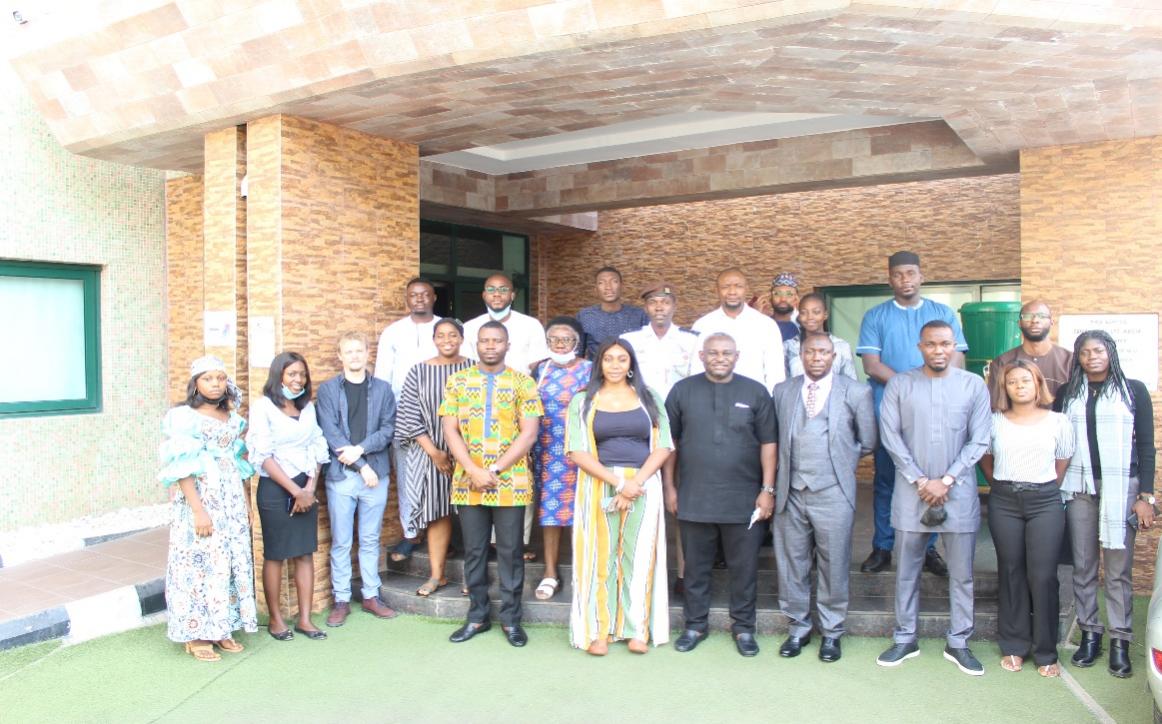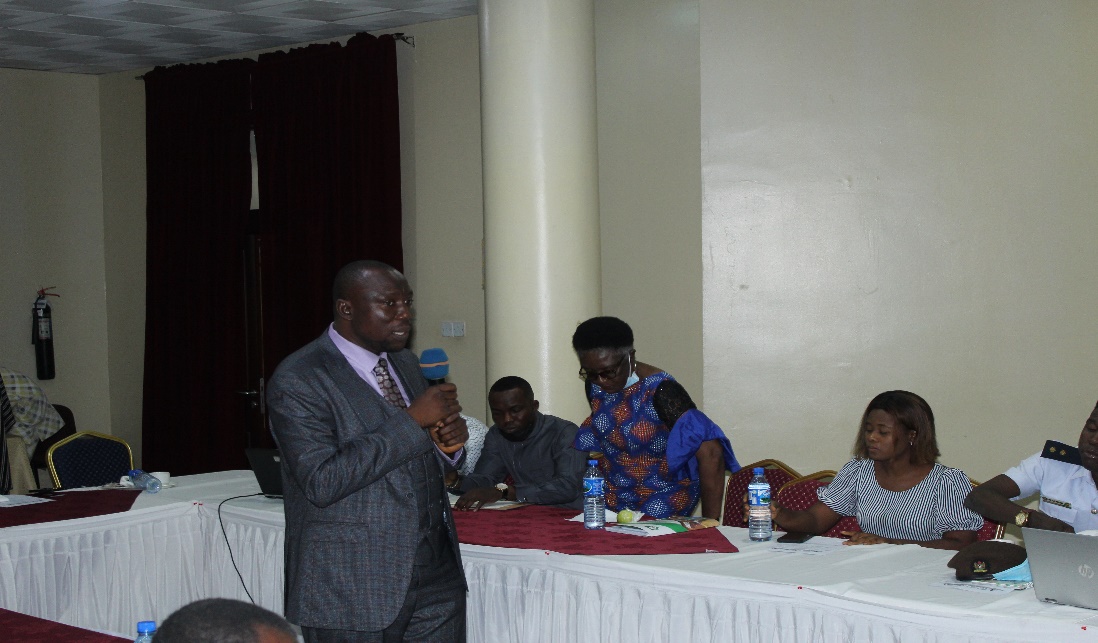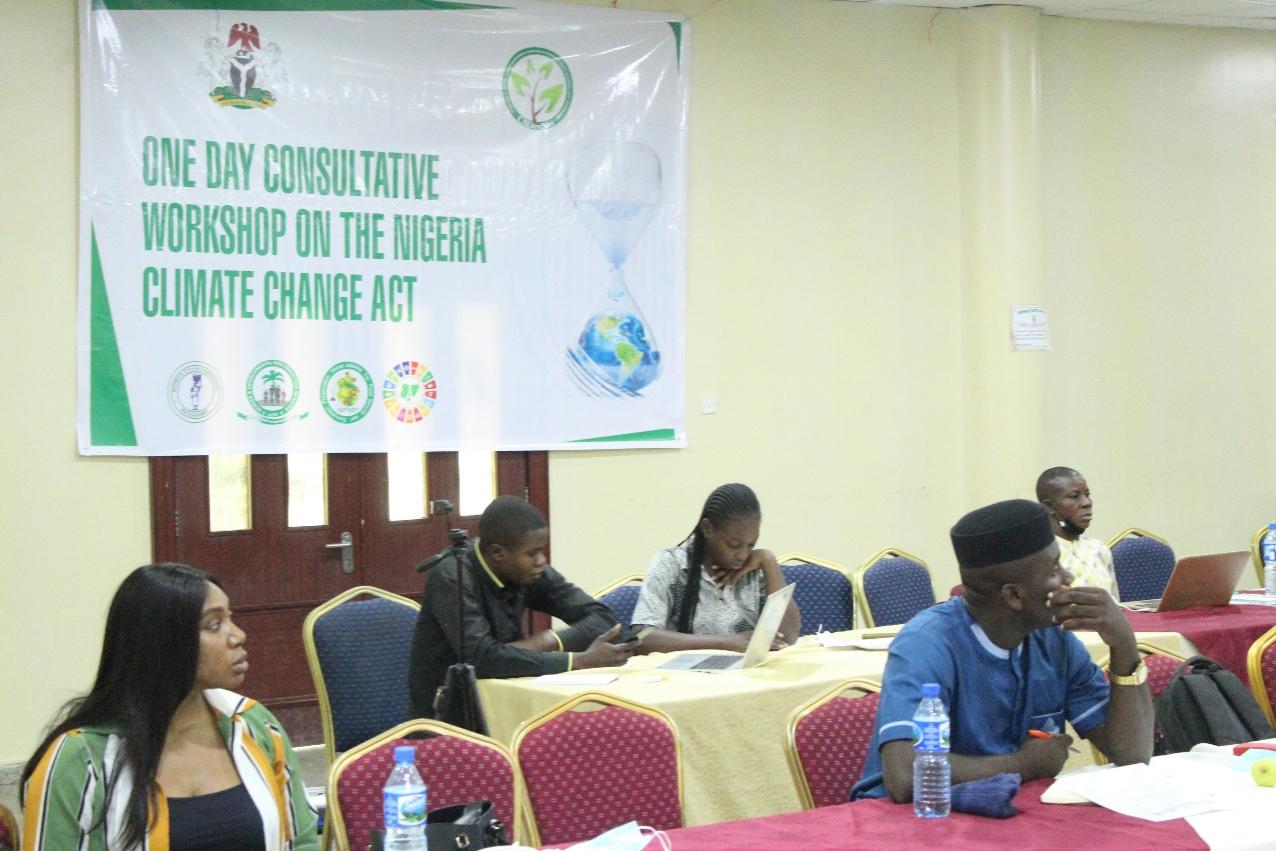
The Climate and Sustainable Development Network of Nigeria (CSDevNet), in collaboration with the Women Environmental Programme (WEP), Gender and Environmental Risk Reduction Initiative (GERI) and Global Initiative for Food Security and Ecosystem Preservation (GIFSEP),under the aegis of Nigerian Civil Society Framework on Paris Agreement and the SDGs (NCSFPAS), held a one-day consultative workshop on Nigeria’s climate change act on the 17th of December 2021 in Abuja, Nigeria.
The consultative workshop aimed at mobilising civil society organisations and other stakeholders for the implementation of the climate change act, inspiring the interest of stakeholders to monitor the implementation of the law, and enhance climate change actions by the government.
In his welcome address, Atayi Babs, the National Network Coordinator (CSDevNet), stated that the workshop focalises on the newly passed climate change act in Nigeria. According to him, Nigeria has joined countries such as Kenya and the rest of the world to develop a climate change act which is an excellent step in the right direction.
“The purpose of the workshop is to set the right procedures or processes in place; it also serves the purpose of avoiding previous mistakes made by other acts in other countries. The collaboration of CSDevNet, WEP, GERI and GIFSEP is to find a way to break down the Act for ‘people’s understanding and propel its implementation in Nigeria.”
He encouraged attendants that with the coming of the climate change act, they must begin to explore relevant sections of the act with a view to driving climate change mitigation and adaptation across the country.
The road to aclimate change act
WEP’s Global President, Dr Priscilla Achapka stated that Nigeria is the second country in Africa after Kenya to have a climate change ac. “The Nigerian government has done a lot to address climate change issues by creating policies that ensure an effective response to climate change” she said.
According to her, Nigeria has adopted a comprehensive strategy and already has several policies and strategic initiatives which, if properly implemented, can serve as good measures for climate change mitigation and adaptation. These measures include the National Policy on Drought and Desertification the National Action Plan on Gender and Climate Change.
The strategic goal for the Nigerian climate change act, she said, is to foster low carbon, high growth economic development pathway and build a climate-resilient society through the attainment of set targets. The plan identifies climate change as one of the major threats to economic development goals and food security.
Nigeria, according to her, has different programs put in place to tackle climate change, such as the gender action plan on climate change which is one of the first policies in Nigeria to address the issue of gender in climate change.
Nigeria was one of the countries that showcased her gender and climate change policy at COP26 to the amazement of other countries who sought to know how Nigeria achieved this. She commended the minister of state for the environment who worked with members of the house of representatives and senate to ensure the bill’s passage.
She concluded by advising that there should be synergy between state actors, civil society organisations and ministries, which will make the act successful in the country despite some noticeable loopholes.
A climate change act for Nigeria
In November 2021, President Muhammadu Buhari signed the climate change bill into law. The law seeks to provide a framework for achieving low greenhouse gas emissions (GHG), inclusive green growth and sustainable economic development.
The climate change law is part of the country’s efforts at reducing greenhouse gas emissions in line with the provisions of the United Nations Framework Convention on Climate Change (UNFCCC) and the Paris Agreement, to which Nigeria is a Party.
While the signing of the climate change bill into law has been applauded by many, it may not achieve its purpose if it is not poorly implemented. For a successful implementation of the climate change law, knowledge of the provisions of the act by relevant stakeholders is very key crucial, as this will inform their projects and programmes, advocacy initiatives as well as, and strategies to hold the government to account for the implementation of the law.
Barrister Yahaya Dangana, in a presentation on the climate change act revealed that the act is divided into eight parts with different objectives, which he read out and analysed.

He explained that the act seeks to provide a framework for achieving low greenhouse gas emission, inclusive green growth and sustainable economic development by ensuring that Nigeria formulates programmes for achieving its long-term goals on climate change mitigation and adaptation, mainstreaming climate change actions in line with national development priorities, ensuring that climate change policies and actions are integrated with other related policies and promoting socio-economic development and environmental integrity.
This act applies to the ministries, departments and agencies of the federal government of Nigeria as well as the private sector.
In his analysis on the objective and application of the act, he said the CSOs should focus on how the funds will be sourced and how the CSOs can tap into the provisions of the act to have a robust campaign.
Some of the issues he stressed include the application of the law, where and who is it applicable to?, what bodies are set aside to monitor the application and implementation of the law?, how many civil society organisations were invited to the public hearing of the bill? e.t.c.
He urged the civil society organisations to come together, challenge the government and hold them accountable when provisions of the act are disregarded. “Its everyone’s collective responsibility to see that things are done accordingly and the existence of the act has placed the CSOs high in holding the government accountable,” he added.
Some of the concerns raised during the consultative workshop include ; How can the lawyers with the interest of the environment at heart contribute towards seeking environmental and social justice in Nigeria? How can the government be held accountable if they fail to fulfill their responsibilities stated in the policies and legislation, and what are the implications when governmental institutions fail? What are the punitive aspects of the climate change act that can be leveraged to bring the change in the sector, considering that amendments take a long time to happen? What about the adaptation process? What ways can improve our adaptation processes? What are the best ways to go about it, how can we advocate for funding in that direction? How can we raise our voices, and how can we push technocrats towards improving the climate adaptation process.

The workshop ended with Civil society groups being enjoined to advocate for the implementation of the climate change act and ask for amendments to provisions that have been highlighted in the workshop; advocate for the appropriate persons to be strategically positioned in the National Council; mainstreaming gender, including persons with disability and support efforts at getting a strong individual as the Head of the National Council, someone who will drive the force and bring prominence to the climate change act.
The media was equally encouraged to push initiatives and set an agenda on environmental protection and remediation, which will change the narrative of national discourse.
